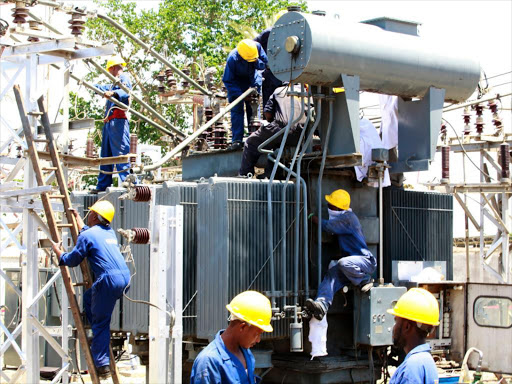Kenya Power engineers carry out maintenance work at a power Sub station. Imagine buying a phone charger today to use in the next 1000 years. Sounds funny, right? But this is exactly what utility firm Kenya Power did between 2006 and 2012.
An audit of the power distributor’s stock data seen by the Star shows it purchased power distribution accessories to last between 13 and 8,050 years based on average monthly consumption.
From systemic losses, ghost workers to over-billing customers, Kenya Power has become an example of how a giant can easily lose its way and fall into a financial hole.
The end result is a firm struggling to stay afloat, doling out high power bills to every Kenyan consumer and constant power blackouts. These are some of the company’s attributes Kenyans will be reflecting on when the firm hits a century next year.
Starting today, the Star will tell you just how the once-profitable government-owned power firm has been mismanaged by senior employees, top government officials, politicians and their cronies.
Although the firm’s financial woes came to the fore in 2018 when police arrested top managers on suspicion of economic crimes after the company was hit by a series of tender scandals involving questionable tenders and suppliers, it is the recent audit by the board that revealed the true extent of the financial woes.
This was after the company posted a historic Sh7 billion loss in 2020.
Its total debt as at end of last June stood at Sh118.73 billion, made up of Sh65.96 billion commercial debt and Sh53.26 billion on-lent debt.
About 77.3 per cent or Sh51.02 billion of the commercial loans are dollar-denominated, making the level of repayment costs susceptible to currency fluctuations.
The firm’s main commercial lenders include Standard Chartered Bank, Rand Merchant Bank, Equity, Stanbic Bank and Agence Franchaise Development.
According to the company, the result was largely impacted by the effects of the Covid-19 on the operating environment and a one-off increase in impairment for inventories amounting to Sh3.65 billion.”This follows a business decision to take a more prudent approach in accounting estimation for slow-moving and obsolete stock,” the then managing director Bernard Ngugi said in a press statement.He resigned from the company early this month, barely two years after his appointment. He was under pressure from the board, shareholders, government and trade unions over turnaround plans amid a streak of losses at the state utility. The board picked Rosemary Oduor to replace […]
